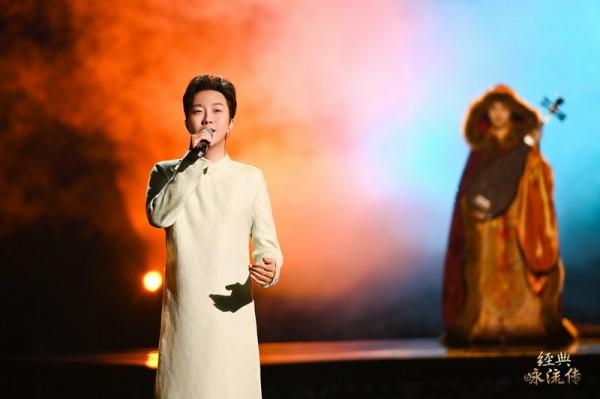Last Saturday night, the ninth issue of "Classic Chant Chuan" was broadcast on CCTV Integrated Channel of China Central Radio and Television. Li Yugang combined the classic sings of the stage play "The Emperor Zhaojun" with Du Fu's "Five Poems of Historic Sites" (Part 3) to bring a dialogue across time and space; Li Zhiting's rock and roll style sang "Yanmen Taishou Xing", full of Energy; Zhou Qi showed Li Bai’s youthful aspirations with a song "Shang Li Yong", Zhao Zhao showed Li Bai’s gentle and quiet side through "Looking at the Wine to the Moon"; Li Yuanhua creatively performed "Ying the Plum", and Feng Xiang sang in dialect and folk songs The beauty of Wuhan leads everyone to feel the dense smoke of Wuhan.
In addition, two hours before the broadcast of the ninth program, the program was broadcast live with the CCTV "Cloud Music Sharing Conference" column. The program’s chief music director Liu Zhuo and the current classic singers Zhao Zhao, Feng Xiang, and Yinque poetry listening group were specially invited. Members participate in the warm-up of the show and share behind-the-scenes stories.
Li Yugang amazingly reproduced "Zhaojun Going out of the Fortress" Li Zhiting's rock and roll singing of ancient poems was praised as "too shocking"
Li Yugang, who has performed many classical characters, once again boarded the stage of "Classic Odes", recreating the legendary story more than 2,000 years ago with a song "Zhaojun Going Out of the Fortress". It is worth mentioning that the whole work combines the classic sings of the stage play "Zhaojun Out of the Fortress" and Du Fu's "Five Poems of Historic Sites" (Part 3), which is even more straightforward under the interpretation of Li Yugang's two roles. Liao Changyong said that such a dialogue that spans time and space not only incorporates opera singing, but also draws on Western bel canto. This innovation is particularly worth learning.
"The black clouds are pressing against the city and the city is about to be destroyed, and the rays of light will open to the golden scales of the sun." Li Zhiting sang the familiar "Yanmen Prefect" with his guitar. The combination of energetic rock elements and traditional drums fully demonstrated the ever-changing tension in the poems, and was praised "too shocking".
After the show was broadcast, Li Zhiting reviewed the creative process on Weibo. From the sample to the finished product, it took a full two months to write nearly four or five versions before reaching his satisfaction. Such a behind-the-scenes story also made netizens lament " It feels like singing with life and soul".
Li Yuanhua's innovative interpretation of "Ying Mei" warms people's hearts and Feng Xiang sings the beauty of Wuhan in dialect and folk songs
Li Yuanhua, who has sang poems for decades, came to "Classic Ode to Spread" for the first time and chose to sing Chairman Mao's classic "Bu Shouzi·Yong Mei". Different from the multiple versions presented on the stage of previous shows, this time, Li Yuanhua performed an innovative interpretation of this poem. From the sonorous Peking opera singing to the warm and moving modern popular singing, a song "Ying Mei" not only warms people's hearts, but also conveys the spirit of high spirits. Inheriting the classics regardless of age, as she said in the program: “Art is not the patent of youth, and fashion is not the patent of young people. We must keep up with the times, like the ancient sages and sages of Chinese poetry, and leave something to the society. Wonderful and warm."
Following the inspiration and touch of "Hanyangmen Garden", Wuhan folk song creator Feng Xiang stepped onto the stage of "Classic Chant Chuan" via video connection and sang his own adaptation of "Twenty-Four Solar Terms Song: Xia Qiu Yao" ". "The spring rain frightens the spring and clears the valley, the summer is full of mans and the summer is hot." He sang the memory of Wuhan in the hearts of millions of people in Wuhan dialect full of fireworks.
Zhao Zhao's "Ask the Wine to the Moon" sings Li Bai's gentle side, Zhou Qi's blood interprets the youth spirit
The image of Li Bai's bold and unconstrained "poetry fairy" is well-known to everyone, and his poems have been interpreted by many classic singers. Zhao Zhao’s "Ask the Wine to the Moon" this time is soothing and deep, letting people see Li Bai's gentle and quiet side. In this regard, Liao Changyong said with emotion: "It can calm your heart, tell you stories and emotions carefully, then poke your heart, and slowly infiltrate your blood."
Unlike the gentle Li Bai shown by Zhao Zhao, Zhou Qi sang Li Bai's youthful aspirations with a song "Shang Li Yong". "Dapeng rises with the same wind in one day, soaring for 90,000 miles." The youth spirit conveyed in the poems inspired many young people. As Kang Zhen said, “The youth spirit is a vigorous and upward force, which is constantly searching for their own possibilities.” In addition, members of the Yinque Poems from all over the world appeared on the screen for the first time and sang "Four Seasons". ", leading everyone to experience the beauty of "spring, summer, autumn and winter" in Tang poetry and Song Ci.
Whether it’s a tender singing or a vigorous performance, "Classic Odes" has undoubtedly become a clear spring that enters the hearts of the audience, integrating the thoughts of the ancients and the people of the present, and letting everyone in the collective memory Produce strong emotional resonance and cultural identity.

